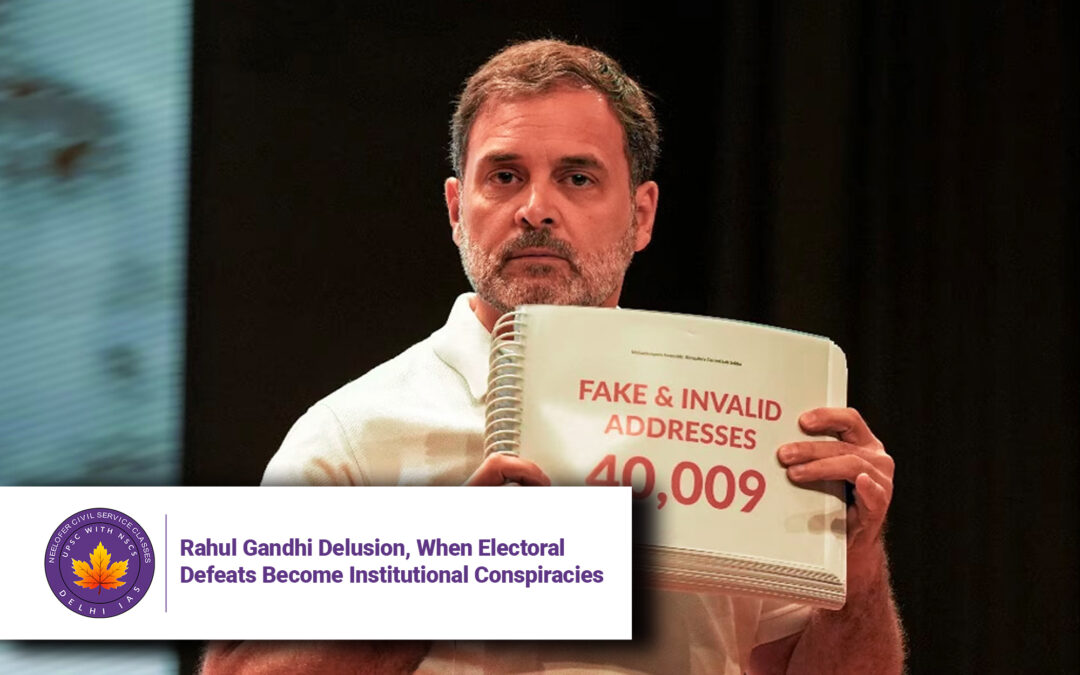Rahul Gandhi Delusion, When Electoral Defeats Become Institutional Conspiracies
Why in News
Recently, Congress leader Rahul Gandhi has once again sparked political debate by blaming institutions such as the Election Commission of India (ECI) and the electoral process for his party’s repeated defeats. In particular, he raised concerns about mass deletion and addition of voters in Bihar and Maharashtra. His statements have ignited strong reactions across the political spectrum, with critics arguing that instead of introspection, Rahul Gandhi continues to externalize electoral failures as institutional conspiracies. This has brought the role of the Election Commission, electronic voting machines (EVMs), and voter roll processes back into the spotlight.
Introduction
In democracies worldwide, losing political parties often face a choice — either introspect and rebuild, or blame external factors. In India, the Congress Party, under Rahul Gandhi’s leadership, has increasingly leaned toward the latter. With more than 90 electoral defeats in the past decade, the Congress Party’s decline has become one of the most striking political developments in modern Indian history.
Rahul Gandhi’s latest remarks revolve around questioning the credibility of the Election Commission’s Special Intensive Revision (SIR) exercise in Bihar and Maharashtra. While this exercise was meant to clean and update voter rolls, Gandhi accused it of enabling mass deletion and manipulation. His arguments echo his earlier attacks on EVMs, which he alleged were being tampered with whenever Congress lost elections.
The controversy raises larger questions about political accountability, institutional credibility, and the future of democratic processes in India. Is the Congress’s stance a genuine concern for electoral integrity, or is it a coping mechanism for repeated electoral defeats?
Key Issues and Background
1. The EVM Debate
The debate on EVMs has been ongoing for years, but it has intensified whenever Congress suffered major losses. Rahul Gandhi and some other opposition leaders have repeatedly raised doubts over EVMs, suggesting they could be manipulated. However, when Congress or its allies win elections in states such as Himachal Pradesh, Karnataka, or Telangana, the same machines are suddenly deemed flawless. This selective criticism has raised eyebrows, with even opposition leaders like Omar Abdullah pointing out the hypocrisy.
2. The Special Intensive Revision (SIR) Exercise
The Election Commission periodically conducts the SIR process to update and clean voter rolls. This involves deletion of duplicate or invalid entries and addition of eligible new voters. The process is collaborative, involving Booth Level Officers (BLOs), field verification, and consultation with stakeholders. By design, it ensures transparency and inclusiveness.
Rahul Gandhi’s criticism of SIR in Bihar and Maharashtra contradicts the very purpose of the exercise. While he accuses it of voter manipulation, the EC defends it as a legal, data-driven, and essential measure for free and fair elections. Critics argue that Gandhi’s contradictory stance — demanding clean rolls while opposing the process to achieve it — exposes an ideological inconsistency.
3. Voter Roll Growth and Reality
Another major issue raised by Gandhi is the alleged irregular growth of voter rolls in states like Maharashtra. He questioned why the BJP was not facing anti-incumbency despite changes in rolls. However, statistical evidence shows that under the UPA (2008–2012), average voter roll growth was actually higher at 4.1%, compared to Maharashtra’s 3.7% in 2024. Thus, the growth is consistent with national trends and does not suggest fraud.
4. Duplicate Votes and BJP Strongholds
Gandhi also alleged that duplicate voter entries benefit BJP strongholds. However, evidence of duplicates has also been found in Congress bastions like Rae Bareli and Wayanad. Analysts argue that voter roll discrepancies, where they exist, are systemic issues, not partisan conspiracies.
5. Congress’s Refusal of Legal Channels
One of the most damning aspects of the controversy is that the Congress Party has refused to file a formal complaint under oath to the Election Commission. Under Indian law — particularly Section 31 of the Representation of the People Act (1950) and Section 227 of the Bharatiya Nyaya Sanhita (2023) — knowingly filing false voter roll accusations is a punishable offence. Critics say this legal obligation is why Gandhi avoids formal complaints, preferring political rhetoric over legal accountability.
Specific Impacts or Effects
-
Erosion of Institutional Trust – Constant attacks on institutions like the ECI risk damaging their credibility in the eyes of voters, even without concrete evidence.
-
Shift in Political Narrative – By blaming institutions, the Congress avoids addressing deeper reasons for its decline, such as weak organizational structure, outdated leadership strategies, and disconnect from new-age voters.
-
Polarization of Debate – The controversy deepens the divide between ruling and opposition parties, with BJP defending institutions while Congress portrays them as compromised.
-
Global Perception of India’s Democracy – Internationally, such accusations may create doubts about India’s electoral integrity, which otherwise is admired as the world’s largest democracy.
-
Legal Risks for Congress – Repeated unsubstantiated accusations expose Congress leaders to potential legal action, including charges of defamation and spreading misinformation.
Challenges and the Way Forward
Challenges:
-
Congress’s Identity Crisis – The party has failed to adapt to changing political realities, clinging instead to allegations.
-
Public Distrust – Repeated claims of manipulation without proof may confuse or disillusion voters.
-
Electoral Fatigue – Overemphasis on institutional blame may alienate young voters who want constructive agendas, not conspiracy theories.
-
Media Narratives – Continuous media debates on EVMs and voter rolls shift focus away from core issues like governance, jobs, and inflation.
Way Forward:
-
Strengthening Institutional Transparency – The Election Commission must continue using technology, third-party audits, and public awareness campaigns to maintain voter trust.
-
Political Accountability – Parties must introspect after losses rather than shifting blame. Healthy democracy requires acceptance of results and strategic evolution.
-
Legal Enforcement – Stronger action against baseless allegations can deter misuse of rhetoric.
-
Public Engagement – Both ruling and opposition parties must focus on voter-centric issues instead of institutional blame games.
-
Collaborative Electoral Reforms – Political consensus on improving voting technology, cybersecurity, and roll management can enhance integrity and reduce controversies.
Conclusion
Rahul Gandhi’s repeated tendency to blame institutions for electoral defeats reflects not just a political strategy but a deeper ideological impasse within the Congress Party. Instead of offering new ideas, organizational renewal, or connecting with aspirational India, the party has increasingly leaned on allegations. This has widened the gulf between its leadership and the broader electorate.
In contrast, India today stands at the intersection of economic growth, technological innovation, and global leadership aspirations. While institutions like the Election Commission continue to strengthen democratic processes, political narratives rooted in denial and blame may weaken faith in democracy itself.
The current debate is more than a political disagreement — it represents a civilizational gap between a rising India and a party still grappling with its decline. For India’s democracy to thrive, political accountability must prevail over delusions of conspiracy.
5 Questions & Answers
Q1. What is Rahul Gandhi’s main criticism against the Election Commission?
Rahul Gandhi accused the Election Commission’s Special Intensive Revision (SIR) exercise in Bihar and Maharashtra of enabling mass voter deletions and additions, suggesting manipulation in favor of the BJP.
Q2. How has the Congress’s stance on EVMs been contradictory?
Congress criticizes EVMs when it loses elections but accepts them when it wins, such as in Himachal Pradesh, Karnataka, and Telangana. This selective criticism has been called hypocritical.
Q3. What evidence disproves Rahul Gandhi’s claims about voter roll growth?
Data shows Maharashtra’s voter roll growth in 2024 was 3.7%, consistent with national averages and lower than the UPA-era average of 4.1%. Thus, the growth is normal, not suspicious.
Q4. Why is Congress hesitant to file formal complaints under oath?
Filing false accusations is a punishable offence under Indian law, including the Bharatiya Nyaya Sanhita (2023). To avoid legal consequences, Congress prefers public statements rather than legal challenges.
Q5. What is the broader implication of Congress’s blame on institutions?
It undermines public trust in democratic institutions, distracts from genuine governance issues, and highlights Congress’s inability to reinvent itself as a credible opposition.



